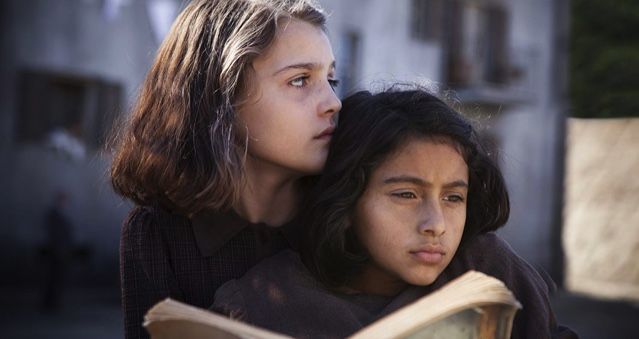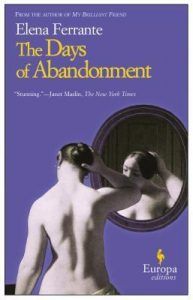
Elena Ferrante Quotes to Read While You Wait for Her New Novel
Elena Ferrante has a new book coming out in November…in Italian, of course. So we English speakers still have to wait for Ann Goldstein’s translation. In the mean time, Europa Editions, her American publisher, did release the first translated lines on Twitter, and they are exquisite. Just check them out:
It begins like this. #ElenaFerrante #NewNovel Translated by Ann Goldstein. pic.twitter.com/wHoNW5yBB2
— Europa Editions (@EuropaEditions) September 9, 2019
Full of anger and pain—each sentence is cut down to its barest bones.
Elena Ferrante has been accused by at least one male critic of being too melodramatic; her writing overwrought with stereotypes and easy metaphors. But her characters are angry. Very angry. These are books about women who have been abused, abandoned, and devastated. She writes about “women destroyed” and women vanished. Her stories are full of violence inflicted by women, and against women. So maybe there is melodrama. Maybe feeding your husband glass after he tells you he’s leaving you is too extraordinary, too unbelievable. Or two women fighting over a man—“entwined” in each others arms until one of their heads hits the floor like a “melon”—feels too overwrought, almost comical?

And her writing is vigorous. Every word seems necessary and important. Ferrante might compare heads to melons, but she compares stories to “breezes, of filtered rays where dust motes dance.” So I guess we could quibble, but for me, Ferrante is a master.
Elena Ferrante only allows one interview per country, and she spoke with Vanity Fair in 2017, so I’ve included quotes from that interview, an interview with her editors for The Paris Review, and some of my favorite quotes from The Days of Abandonment and My Brilliant Friend:
Finding words for what is “crouched and silent”:
“In general, we store away our experiences and make use of timeworn phrases—nice, ready-made, reassuring stylizations that give us a sense of colloquial normality. But in this way, either knowingly or unknowingly, we reject everything that, to be said fully, would require effort and a torturous search for words. Honest writing forces itself to find words for those parts of our experience that is crouched and silent.” —“The Mysterious, Anonymous Author Elena Ferrante on the Conclusion of Her Neapolitan Novels,” Vanity Fair
Having a “permanent sense of nausea”:
“I felt squeezed in that vise along with the mass of everyday things and people, and I had a bad taste in my mouth, a permanent sense of nausea that exhausted me, as if everything, thus compacted, and always tighter, were grinding me up, reducing me to a repulsive cream.” —My Brilliant Friend
When “fragments of reality become utterable”:
“Often that which we are unable to tell ourselves coincides with that which we do not want to tell, and if a book offers us a portrait of those things, we feel annoyed, or resentful, because they are things we all know, but reading about them disturbs us. However, the opposite also happens. We are thrilled when fragments of reality become utterable.” —“The Mysterious, Anonymous Author Elena Ferrante on the Conclusion of Her Neapolitan Novels,” Vanity Fair
“I am”:
“I am the queen of spades, I am the wasp that stings, I am the dark serpent. I am the invulnerable animal who passes through fire and is not burned.” —The Days of Abandonment
To write “stories full of breezes, of filtered rays where dust motes danced”:
“Cultured women, in comfortable circumstances, they broke like knick- knacks in the hands of their straying men. They seemed to me sentimental fools: I wanted to be different, I wanted to write stories about women with resources, women of invincible words, not a manual for the abandoned wife with her lost love at the top of her thoughts. I was young, I had pretensions. I didn’t like the impenetrable page, like a lowered blind. I liked light, air between the slats. I wanted to write stories full of breezes, of filtered rays where dust motes danced. And then I loved the writers who made you look through every line, to gaze downward and feel the vertigo of the depths, the blackness of inferno.” —The Days of Abandonment
“A magma of unbearable heat”:
“But whenever I get to the real start of the story, I tend toward an expansive sentence that has a cold surface and, visible underneath it, a magma of unbearable heat. I want readers to know from the first lines what they will have to deal with.” —“Elena Ferrante, Art of Fiction No. 228,” The Paris Review
The “women destroyed”:
“Get rid of the women destroyed.” —The Days of Abandonment
The carelessness and unjust usurpation of time:
“He had taken for himself time, time, all the time of my life, only to toss it out with the carelessness of a whim. What an unjust, one-sided decision. To blow away the past as if it were a nasty insect that has landed on your hand.” —The Days of Abandonment
On trust:
“Ah the head: I could no longer trust it.” —The Days of Abandonment
From romance to the “incoherence of the world”:
“Hold the commas, hold the periods. It’s not easy to go from the happy serenity of a romantic stroll to the chaos, to the incoherence of the world.” —The Days of Abandonment
On literary truth:
“Literary truth is not the truth of the biographer or the reporter, it’s not a police report or a sentence handed down by a court. It’s not even the plausibility of a well-constructed narrative. Literary truth is entirely a matter of wording and is directly proportional to the energy that one is able to impress on the sentence. And when it works, there is no stereotype or cliché of popular literature that resists it. It reanimates, revives, subjects everything to its needs.” —“Elena Ferrante, Art of Fiction No. 228,” The Paris Review
To sleep in the “darkest depths”:
“Once he fucked me, now he fucks someone else, what claim do I have? Time passes, one goes, another arrives. I was about to swallow some pills, I wanted to sleep lying in the darkest depths of myself.” —The Days of Abandonment
Facing what disturbs us:
“Our heads are crowded with a very heterogeneous mix of material, fragments of time periods, conflicting intentions that cohabit, endlessly clashing with one another. As a writer I would rather confront that overabundance, even if it is risky and confused, than feel that I’m staying safely within a scheme that, precisely because it is a scheme, always ends up leaving out lots of real stuff because it is disturbing. —“The Mysterious, Anonymous Author Elena Ferrante on the Conclusion of Her Neapolitan Novels,” Vanity Fair
On Desire:
“Desire cuts off. Maybe it only cuts.” —The Days of Abandonment
Children don’t understand the meaning of time:
“Children don’t know the meaning of yesterday, of the day before yesterday, or even of tomorrow, everything is this, now: the street is this, the doorway is this, the stairs are this, this is Mamma, this is Papa, this is the day, this the night.” —My Brilliant Friend
“Words that killed”:
“Our world was like that, full of words that killed: croup, tetanus, typhus, gas, war, lathe, rubble, work, bombardment, bomb, tuberculosis, infection. With these words and those years I bring back the many fears that accompanied me all my life.” —My Brilliant Friend
On beauty:
“Because what is the face, what finally, is the skin over the flesh, a cover, a disguise, rouge for the insupportable horror of our living nature.” —The Days of Abandonment
A “rage that had no end”:
“They were more severely infected than the men, because while men were always getting furious, they calmed down in the end; women, who appeared to be silent, acquiescent, when they were angry flew into a rage that had no end.” —My Brilliant Friend
Developing a sense of self through “relationships with other women”:
“I grew up with the idea that if I didn’t let myself be absorbed as much as possible into the world of eminently capable men, if I did not learn from their cultural excellence, if I did not pass brilliantly all the exams that world required of me, it would have been tantamount to not existing at all. Then I read books that exalted the female difference and my thinking was turned upside down. I realized that I had to do exactly the opposite: I had to start with myself and with my relationships with other women—this is another essential formula—if I really wanted to give myself a shape.” —“The Mysterious, Anonymous Author Elena Ferrante on the Conclusion of Her Neapolitan Novels,” Vanity Fair
On broken clocks:
“A broken clock that, because its metal heart continued to beat, was now breaking the time of everything else.” —The Days of Abandonment











